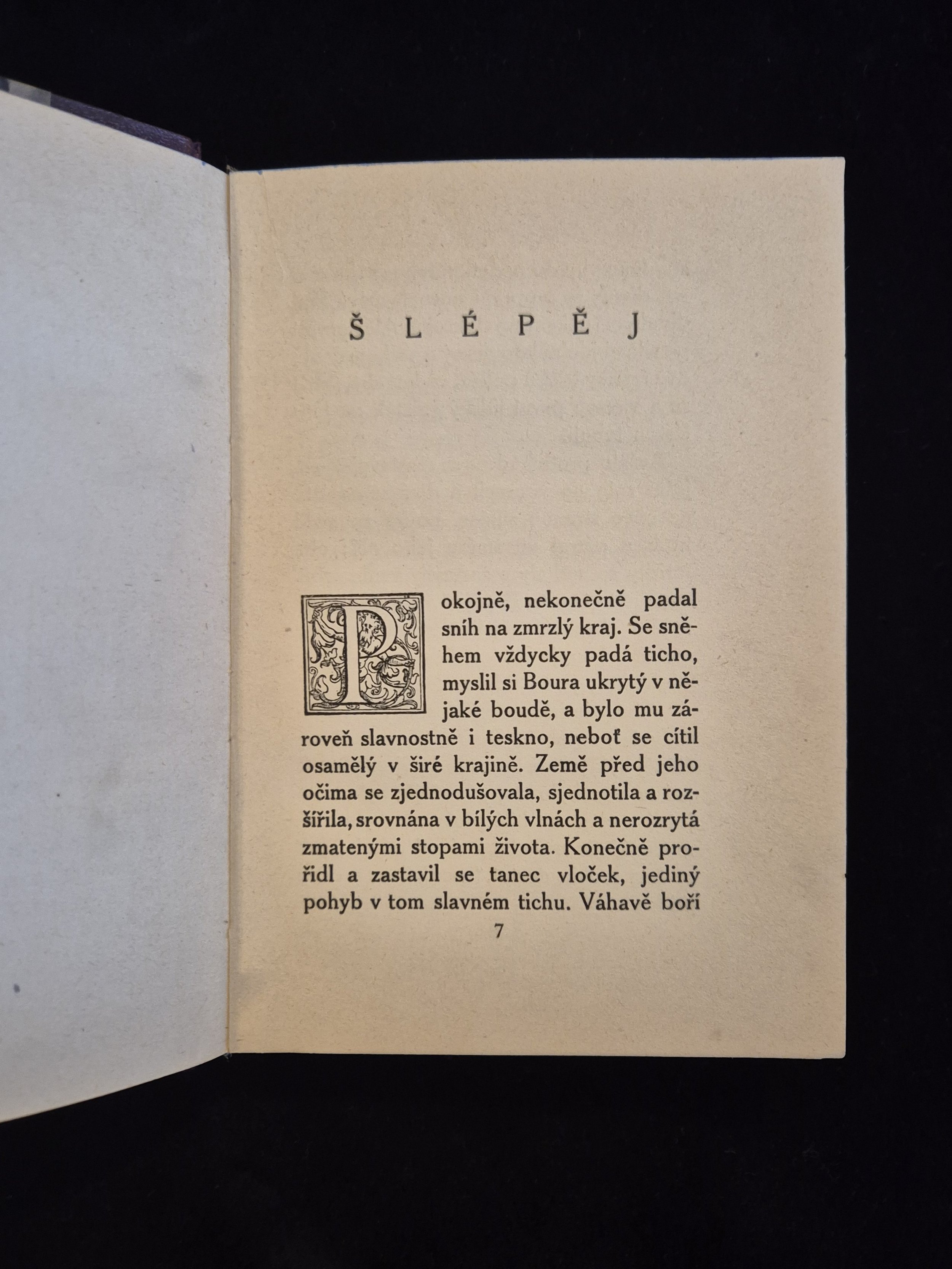Boží muka
ČAPEK, Karel.
Boží muka
Prague: J[an] Otto, 1917
Small 8vo., 20th century maroon leatherette over marbled paper boards; upper edge stained blue; with decorative yellow paste-paper endpapers featuring a repeating ivy design; pp. [vi], 7-200, [iv]; title with decorative border and publisher’s vignette in black; engraved initials to start of each chapter, as well as tailpieces to end, most decoratively so to the final p. [201]; with table of contents to p. [203]; a wonderful, fresh copy, a couple of tiny spots to rear paste-down, pages very lightly, and evenly, toned; the binding a touch rubbed at edges with one or two faint splash marks, else essentially a fine example of a scarce work.
FIRST EDITION OF ČAPEK'S FIRST PUBLISHED WORK. Literally translating as "the agony of God", Boží muka is a collection of thirteen short stories heavily influenced by the traumatic events of the First World War. The short pieces all focus on some seemingly supernatural event, apparently defying human reason, and display the author's sense of compassion for human beings and their errors.
Čapek was a major figure in interbellum Czech letters, and was nominated for the Nobel Prize in Literature seven times. He is best known for the 1936 book War with the Newts, a satirical science fiction take on man's need to exploit others, and how that backfires. He is also credited with, thanks to Rossum's Universal Robots, for introducing the word 'robot' into the English language.
Rare indeed in such condition.
ČAPEK, Karel.
Boží muka
Prague: J[an] Otto, 1917
Small 8vo., 20th century maroon leatherette over marbled paper boards; upper edge stained blue; with decorative yellow paste-paper endpapers featuring a repeating ivy design; pp. [vi], 7-200, [iv]; title with decorative border and publisher’s vignette in black; engraved initials to start of each chapter, as well as tailpieces to end, most decoratively so to the final p. [201]; with table of contents to p. [203]; a wonderful, fresh copy, a couple of tiny spots to rear paste-down, pages very lightly, and evenly, toned; the binding a touch rubbed at edges with one or two faint splash marks, else essentially a fine example of a scarce work.
FIRST EDITION OF ČAPEK'S FIRST PUBLISHED WORK. Literally translating as "the agony of God", Boží muka is a collection of thirteen short stories heavily influenced by the traumatic events of the First World War. The short pieces all focus on some seemingly supernatural event, apparently defying human reason, and display the author's sense of compassion for human beings and their errors.
Čapek was a major figure in interbellum Czech letters, and was nominated for the Nobel Prize in Literature seven times. He is best known for the 1936 book War with the Newts, a satirical science fiction take on man's need to exploit others, and how that backfires. He is also credited with, thanks to Rossum's Universal Robots, for introducing the word 'robot' into the English language.
Rare indeed in such condition.
ČAPEK, Karel.
Boží muka
Prague: J[an] Otto, 1917
Small 8vo., 20th century maroon leatherette over marbled paper boards; upper edge stained blue; with decorative yellow paste-paper endpapers featuring a repeating ivy design; pp. [vi], 7-200, [iv]; title with decorative border and publisher’s vignette in black; engraved initials to start of each chapter, as well as tailpieces to end, most decoratively so to the final p. [201]; with table of contents to p. [203]; a wonderful, fresh copy, a couple of tiny spots to rear paste-down, pages very lightly, and evenly, toned; the binding a touch rubbed at edges with one or two faint splash marks, else essentially a fine example of a scarce work.
FIRST EDITION OF ČAPEK'S FIRST PUBLISHED WORK. Literally translating as "the agony of God", Boží muka is a collection of thirteen short stories heavily influenced by the traumatic events of the First World War. The short pieces all focus on some seemingly supernatural event, apparently defying human reason, and display the author's sense of compassion for human beings and their errors.
Čapek was a major figure in interbellum Czech letters, and was nominated for the Nobel Prize in Literature seven times. He is best known for the 1936 book War with the Newts, a satirical science fiction take on man's need to exploit others, and how that backfires. He is also credited with, thanks to Rossum's Universal Robots, for introducing the word 'robot' into the English language.
Rare indeed in such condition.





